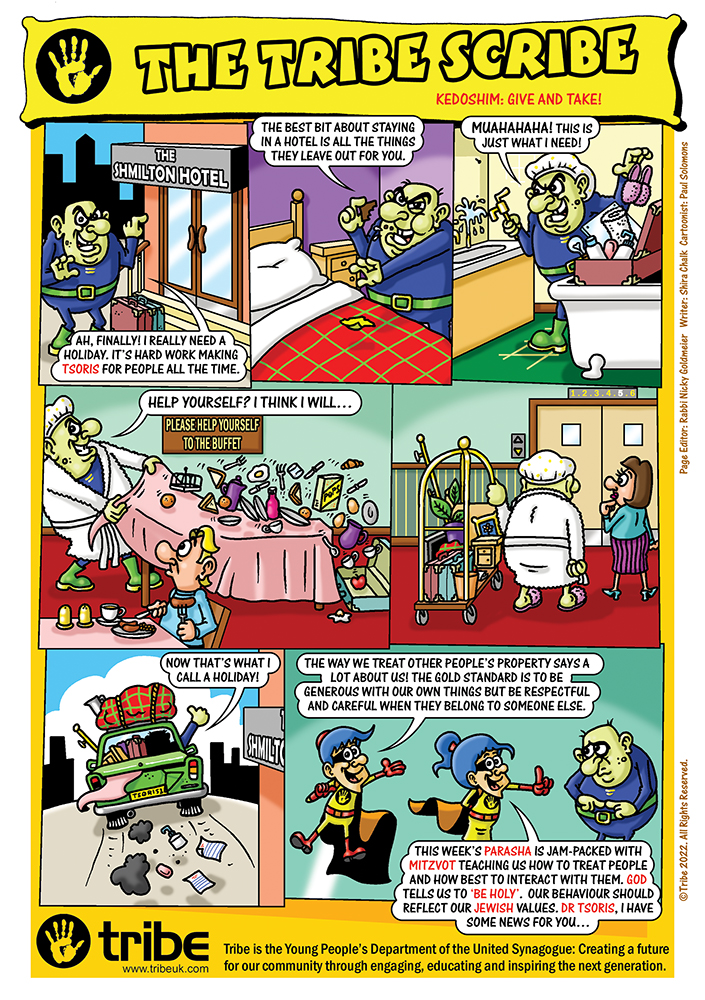Bonjour / Hello [nickname_else_first_name],
SEFIRAT HAOMER BOOKLET
Isaac Darwiche has put together this years booklet for Sefirat Haomer which can be found here
CLICK HERE to Download the MA SFIRAT HA'OMER booklet
Table of contents
1) Perashat Hashavoua - Rabbi Eli Mansour
2) Halakhat Hashavoua (Halakhot related to day to day life) By Hazzan David Azerad -
The Congregation’s Conduct During Torah Reading - peninei halacha
3) Holy Jokes!
4) For KIDS

This Week's Parasha Insight with Rabbi Eli Mansour
Parashat Kedoshim- Understanding the Three Years of Orla
The Torah in Parashat Kedoshim presents the command of Orla, which forbids partaking of the fruit of a tree for the first three years after it is planted.
The Zohar explains that G-d forbade eating a tree’s fruit for the first three years because during this period, the fruit contains Tum’a (impurity). In G-d’s great love for the Jewish People, He wants to keep us away from impurity, and so He commanded us to refrain from fruits produced by a tree during its first three years, when the fruit is "contaminated" by Tum’a.
The Panim Yafot (Rav Pinchas Ha’levi Horowitz, 1731-1805) explains that the source of this impurity is the "sin" committed by the ground at the time of the world’s creation. The Midrash teaches that G-d intended for the ground to produce trees that were flavorful in their entirety – even in the bark. The ground violated G-d’s command by producing trees that bore tasty fruit, but were otherwise tasteless. The Panim Yafot adds that since the ground committed this sin, Adam – who was created from the ground – ended up violating G-d’s command, as well. And for this reason, in response to Adam’s sin of partaking of the forbidden fruit, G-d not only punished mankind, but also cursed the ground ("Arura Ha’adama" – Bereshit 3:17). The ground was cursed for its role in Adam’s sin – for having violated G-d’s command, which resulted in Adam’s violating G-d’s command. Due to this curse, the fruit of new trees are impure, and it takes three years for this impurity to be eliminated. Hence, as the Zohar writes, G-d forbade partaking of a tree’s fruit during its first three years, because the fruit during this time is contaminated as a result of the curse which G-d pronounced on the ground in the wake of Adam’s sin.
This concept has been explained further on the basis of a different passage of the Zohar, explaining the practice to recite each night before Arbit the verse, "Ve’hu Rahum Yechaper Avon Ve’lo Yash’hit…" This verse, the Zohar writes, includes the words "Yash’hit," "Apo" and "Hamato," which refer to three harmful spirits: "Mash’hit," "Af" and "Hema." We recite this verse each night in order to neutralize, as it were, these threatening forces so they do not cause us harm. This verse is not recited on Shabbat, as these forces are powerless on Shabbat. Now the Megaleh Amukot (Rav Natan Nata Shapiro, 1585-1633) writes (in Parashat Vayishlah) that these three forces – "Mash’hit," "Af" and "Hema" – are the spirits that take a person’s life when his time comes to depart from this world. It emerges, then, that these three forces came into being as a result of Adam’s sin, which introduced death into the world. If this is the case, then we can easily understand why, as the Zohar teaches, it takes three years for a tree to lose its impurity. The source of this impurity is Adam’s sin of the forbidden fruit, which brought the three harmful spirits into the world. The power of each spirit is overcome in one year, such that it takes three years for the impure forces to be entirely overcome.
This explains an otherwise baffling comment of the Midrash (Vayikra Rabba 25:2) relevant to the prohibition of Orla. The Midrash cites Rabbi Yehuda Ben Pazi as exclaiming, "Who will remove the earth from your eyes, Adam Ha’rishon – you were unable to obey your command one hour, and your children wait the three years of Orla!" It appears, at first glance, that Rabbi Yehuda Ben Pazi is taunting Adam, ridiculing him for failing to obey the command not to partake of the forbidden tree, noting that the Jewish People faithfully observe the command of Orla and refrain from a tree’s produce for its first three years. But why would Rabbi Yehuda Ben Pazi want to taunt Adam? Furthermore, the Midrash concludes that Rabbi Yehuda Ben Pazi’s uncle, Bar Kapara, heard this remark, whereupon he enthusiastically praised his nephew’s teaching. What was so profound about Rabbi Yehuda’s statement?
This question has been answered in light of the connection between the law of Orla and Adam’s sin in Gan Eden, developed above. The Midrash (Shemot Rabba 32:1) comments that Adam "did not withstand his test for three hours." The commentators explain this to mean that the command to refrain from the forbidden tree was intended to be only temporary. This command, as the Gemara (Sanhedrin 38b) teaches, was given at the ninth hour of the day of Adam’s creation, and, the commentators add, it was intended to apply only for the next three hours – until the onset of Shabbat. If so, then we understand the connection between Orla and Adam’s sin on a deeper level. In order to correct the mistake by Adam, who failed to abstain from the forbidden tree for three hours, we abstain from the fruit of a newly-planted tree for three years.
This, then, is the meaning of Rabbi Yehuda Ben Pazi’s proclamation. He was not expressing disdain for Adam, but rather drawing attention to the fact that Adam’s descendants are doing what they can to correct his mistake. He was expressing his wish that Adam could see how his descendants, the Jewish People, are bringing about the rectification of his grave mistake by refraining from a tree’s fruit for its first three years – thereby reversing the effects of his tragic failure to abstain from the forbidden tree for three hours.

Halachot this week are selected and Translated by Hazzan David Azerad
The Congregation’s Conduct During Torah Reading - peninei halacha
It is forbidden to leave the synagogue from the beginning of the Torah reading until its conclusion. Even someone who already heard the Torah reading is forbidden to leave. If one does leave, he offends the respect of the Torah. Of him it is written (Isaiah 1:28), “Those who abandon God will perish.” One who must leave, such as a person whose only ride to work is about to depart(during the weekdays -not Shabbat or Chagim), is permitted to leave between aliyot, for then the Torah scroll is closed and the offense to the respect of the Torah is minimal (Shulchan Aruch, Orach Chaim 146:1).
In principle, there is no obligation to stand throughout the Torah reading, though there are some who enhance the mitzvah by standing, just as all the Jews stood at Mount Sinai (Rama 46:7). Some are strict to stand when answering “Baruch Hashem HaMevorach L’Olam Va’ed” since it is a matter of sanctity, and the recital of a matter of sanctity requires that one stands (Mishnah Berurah 146:18). According to many, it is unnecessary to stand when the Torah is being read, and that is how the Shulchan Aruch rules (146:4). The Ari HaKadosh was also accustomed to sit throughout the whole reading, even when Barchu was recited (Kaf HaChaim 146:20). Indeed this is the custom in many Sephardic and Ashkenazic synagogues.
From the time the Torah scroll is opened to be read, the people in the congregation are forbidden to talk to one another, even concerning matters of halachah (Sotah 39a). There is an opinion which permits a few brief words of Torah between the aliyot, provided that the exchange does not continue into the berachot or Torah reading (Bach). Some say that it is even forbidden to talk matters of Torah in-between aliyot and that it is only permitted to learn alone at that time (Eliyah Rabbah). It is good to be strict concerning this, because if people start to talk about matters of Torah, it will be hard to stop when the person called up begins to recite the blessing.
It is permissible for a rabbi to answer an urgent question in the breaks between the aliyot (Mishnah Berurah 146:6). Gabbaim are also permitted, during the breaks, to talk about essential matters that are pertinent to the prayer service. When there is no other option, it is permitted for a rabbi to answer questions even at the time of the Torah reading. Likewise, the gabbaim are permitted to talk about pressing issues which demand immediate attention; for instance, how to avoid insulting one of the people praying who expects to be given an aliyah.
Bevirkat Shabbat Shalom Umevorach
David Azerad
3) HOLY JoKeS!!
Selection of funny snippets, loosely related to this weeks parashah or current events, to brighten your day

4) FOR KIDS
Click on the image to open the youtube video


















